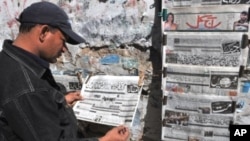As the U.S.-led coalition targets a major Taliban stronghold in Afghanistan, U.S. officials say they have captured the group's top military commander in Pakistan, with the help of Pakistani authorities. The arrest of Mullah Abdul Ghani Baradar follows reports that Pakistani Taliban leader, Hakimullah Mehsud, died in a suspected U.S. missile strike in Pakistan earlier this year. Our correspondent in Islamabad examines the U.S.-Pakistani relationship in the fight against the Taliban.
The NATO and Afghan joint offensive in southern Afghanistan is the biggest operation of its kind since the war began in late 2001.
At the same time, Pakistan remains embroiled with its fight against the Taliban's Pakistani syndicate that is headquartered in the country's tribal areas bordering Afghanistan. Analysts say this fight appears to have expanded against Afghan Taliban elements believed to be taking refuge in Pakistan.
On Wednesday, the Pakistani military confirmed reports authorities had captured the Afghan Taliban's second-in-command, Mullah Abdul Ghani Baradar, in Karachi. Up until now, the Pakistani government publicly had denied the presence of Afghan Taliban leaders in Pakistan.
But Pakistan's former ambassador to Afghanistan, Ayaz Wazir, tells VOA that he believes Afghan Taliban continue to find refuge across the border, especially in light of the increased military pressure in southern Afghanistan.
"They are certainly in Pakistan," said Ayaz Wazir. "When they are in trouble, they cross, and when they are not, they would go back. So it is an open border almost, they can come at will and go back at will."
In the past, critics accused Pakistan of ignoring the activities of Afghan Taliban insurgents in the tribal areas. But now, analysts say the arrest of Mullah Baradar signals that Pakistan may no longer be so complacent. Some even say it could be the start of a Pakistani-assisted peace dialogue for Afghanistan.
"Why has he been arrested now? Maybe it is one way of conducting negotiations with the people there for [Baradar] to have face saving for the Taliban to say, 'I have been arrested,'" he said.
Pakistan has long maintained that it wants to play a central role in the peace and reconciliation process. And Wazir says open peace talks between the Taliban and the Afghan government will be difficult as long as the insurgents believe President Hamid Karzai is under U.S. pressure.
"I believe the trust deficit between the two is too big to come to a negotiating table," said Wazir.
Some regional experts also say that Mullah Baradar's arrest in Pakistan coupled with advances in the ongoing NATO-Afghan offensive in southern Afghanistan could weaken the Taliban to the point where insurgents abandon the group's hard-liners to join the peace process.
Analysts: Taliban Commander Arrest Signals Change in Pakistani Mindset
- By Sean Maroney




